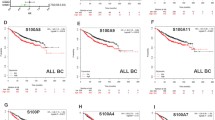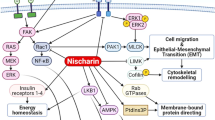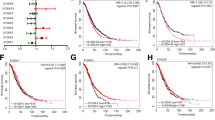Abstract
The S100 gene family encode low molecular weight proteins implicated in cancer progression. In this study, we analyzed the expression of four S100 genes in one cohort of patients with breast cancer and 16 S100 genes in a second cohort. In both cohorts, the expression of S100A8 and S1009 mRNA level was elevated in high-grade compared to low-grade tumors and in estrogen receptor-negative compared to estrogen receptor-positive tumors. None of the S100 transcripts investigated were significantly associated with the presence of lymph node metastasis. Notably, multiple S100 genes, including S100A1, S100A2, S100A4, S100A6, S100A8, S100A9, S100A10, S100A11, and S100A14 were upregulated in basal-type breast cancers compared to non-basal types. Using Spearman’s correlation analysis, several S100 transcripts correlated significantly with each other, the strongest correlation has been found between S100A8 and S100A9 (r = 0.889, P < 0.001, n = 295). Of the 16 S100 transcripts investigated, only S100A11 and S100A14 were significantly associated with patient outcome. Indeed, these two transcripts predicted outcome in the cohort of patients that did not receive systemic adjuvant therapy. Based on our findings, we conclude that the different S100 genes play varying roles in breast cancer progression. Specific S100 genes are potential targets for the treatment of basal-type breast cancers.


Similar content being viewed by others
References
Donato R. S100: a multigene family of calcium-modulated proteins of the EF-hand type with intracellular and extracellular functional roles. Int J Biochem Cell Biol. 2001;33:637–68.
Salama I, Malone PS, Mihaimeed F, Jones JL. A review of the S100 proteins in cancer. EJSO. 2008;34:357–64.
Davies BR, Barraclough R, Davies MP, Rudland PS. Production of the metastatic phenotype by DNA transfection in a rat mammary model. Cell Biol Int. 1993;17:871–9.
Ambartsumian NS, Grigorian MS, Larsen IF, et al. Metastasis of mammary carcinomas in GRS/A hybrid mice transgenic for the mts1 gene. Oncogene. 1996;13:1621–30.
Barraclough R, Chen HJ, Davies BR, et al. Use of DNA transfer in the induction of metastasis in experimental mammary systems. Biochem Soc Symp. 1998;63:273–94.
Davies MP, Rudland PS, Robertson L, et al. Expression of the calcium-binding protein S100A4 (p9Ka) in MMTV-neu transgenic mice induces metastasis of mammary tumours. Oncogene. 1996;13:1631–7.
Levett D, Flecknell PA, Rudland PS, et al. Transfection of S100A4 produces metastatic variants of an orthotopic model of bladder cancer. Am J Pathol. 2002;160:693–700.
Bulk E, Sargin B, Krug U, et al. S100A2 induces metastasis in non-small cell lung cancer. Clin Cancer Res. 2009;15:22–9.
McKiernan E, O’Brien K, Grebenchtchikov N, et al. Protein kinase Cdelta expression in breast cancer as measured by real-time PCR, western blotting and ELISA. Br J Cancer. 2008;99:1644–50.
van de Vijver MJ, He YD, van’t Veer LJ, et al. A gene expression signature as a predictor of survival in breast cancer. N Engl J Med. 2002;347:1999–2009.
Sieuwerts AM, Meijer-van Gelder ME, Timmermans M, et al. How ADAM-9 and ADAM-11 differentially from estrogen receptor predict response to tamoxifen treatment in patients with recurrent breast cancer; a retrospective study. Clin Cancer Res. 2005;11:7311–21.
Sorlie T, Tibshirani R, Parker J, et al. Repeated observation of breast tumor subtypes in independent gene expression data sets. Proc Natl Acad Sci USA. 2002;99:12963–8.
Sørlie T. Molecular portraits of breast cancer: tumour subtypes as distinct disease entities. Eur J Cancer. 2004;40:2667–75.
Rakha EA, Reis-Filho JS, Ellis IO. Basal-like breast cancer: a critical review. J Clin Oncol. 2008;26:2568–81.
Wolf R, Voscopoulos C, Winston J, et al. Highly homologous hS100A15 and hS100A7 proteins are distinctly expressed in normal breast tissue and breast cancer. Cancer Lett. 2009;277:101–7.
Rudland PS, Platt-Higgins A, Renshaw C, et al. Prognostic significance of the metastasis-inducing protein S100A4 (p9Ka) in human breast cancer. Cancer Res. 2000;60:1595–603.
Gonçalves A, Charafe-Jauffret E, Bertucci F, et al. Protein profiling of human breast tumor cells identifies novel biomarkers associated with molecular subtypes. Mol Cell Proteomics. 2008;7:1420–33.
Rhee DK, Park SH, Jang KY. Molecular signatures associated with transformation and progression to breast cancer in the isogenic MCF10 model. Genomics. 2008;92:419–28.
Maelandsmo GM, Flørenes VA, Mellingsaeter T, et al. Differential expression patterns of S100A2, S100A4 and S100A6 during progression of human malignant melanoma. Int J Cancer. 1997;74:464–9.
Vogl T, Leukert N, Barczyk K, et al. Biophysical characterization of S100A8 and S100A9 in the absence and presence of bivalent cations. Biochim Biophys Acta. 2006;1763:1298–308.
Acknowledgements
This work was supported by the Health Research Board of Ireland (Breast Cancer Metastasis: Biomarkers and Functional Mediators, PRP/2005/35) and Science Foundation Ireland, Strategic Research Cluster award (08/SRC/B1410) to Molecular Therapeutics for Cancer, Ireland.
Conflicts of interest
None
Author information
Authors and Affiliations
Corresponding author
Rights and permissions
About this article
Cite this article
McKiernan, E., McDermott, E.W., Evoy, D. et al. The role of S100 genes in breast cancer progression. Tumor Biol. 32, 441–450 (2011). https://doi.org/10.1007/s13277-010-0137-2
Received:
Accepted:
Published:
Issue Date:
DOI: https://doi.org/10.1007/s13277-010-0137-2




